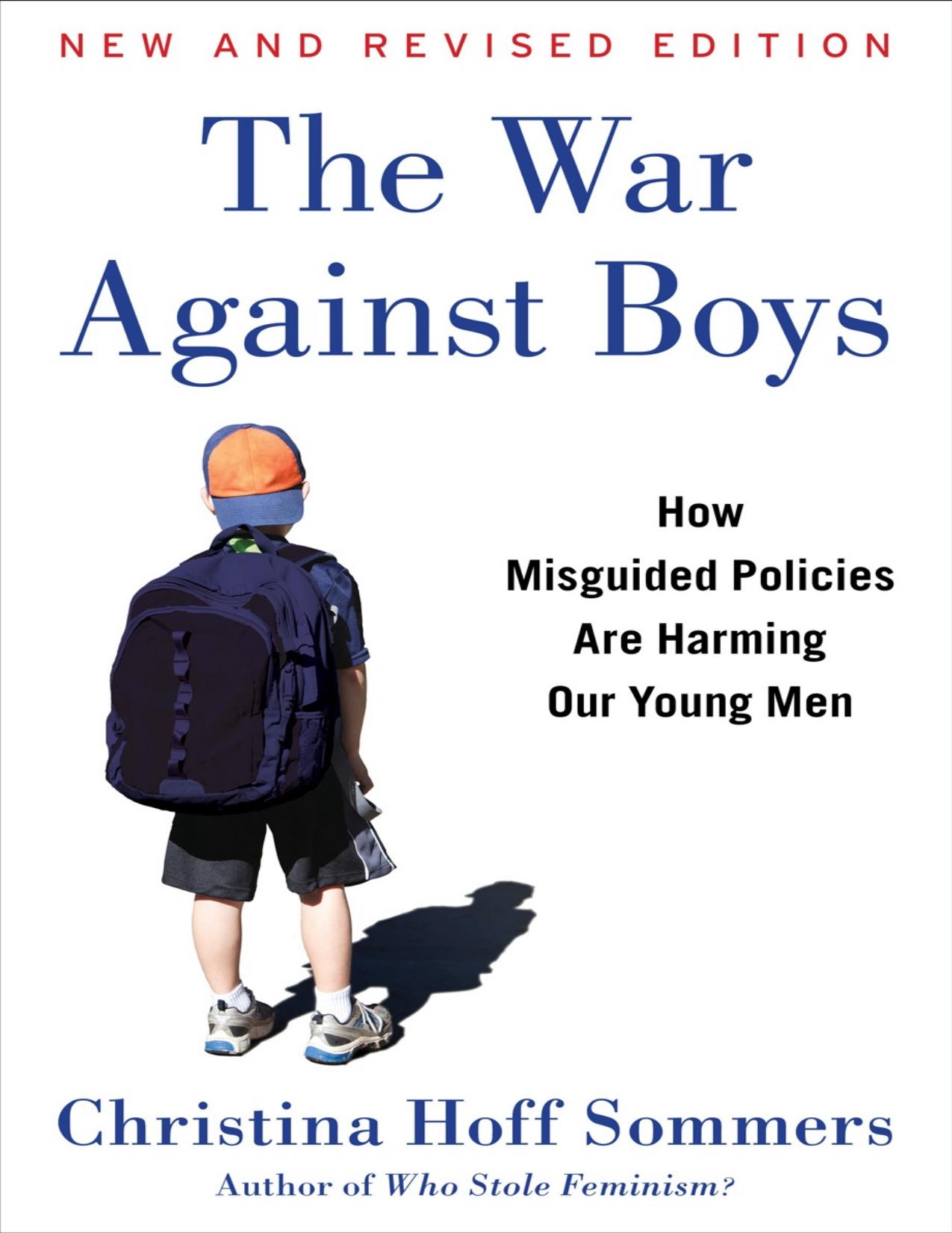The War Against Boys by Christina Hoff Sommers

Author:Christina Hoff Sommers
Language: eng
Format: epub, azw3, pdf
Publisher: Simon & Schuster
Boys Out of Touch
I have inveighed against the large, extreme, and irresponsible claims of the crisis writers, pointing out that no credible evidence backs them up. What about their more moderate and seemingly reasonable assertions? Gilligan and Pollack speak of boys as hiding their humanity and submerging their sensitivity. They suggest that apparently healthy boys are emotionally repressed and out of touch with their feelings. Is that true?
When my son David was thirteen, he sometimes showed the kind of emotional disengagement that worries the boy reformers. He came to me one evening when he was in the seventh grade, utterly confused by his homework assignment. Like many contemporary English and social studies textbooks, his book, Write Source 2000, was chock-full of exercises designed to improve children’s self-esteem and draw them out emotionally.38 “Mom, what do they want?” David asked. He had read a short story in which one character always compared himself to another. Here are the questions David had to answer:
• Do you often compare yourself with someone?
• Do you compare to make yourself feel better?
• Does your comparison ever make you feel inferior?
Another set of questions asked about profanity in the story:
• How do you feel about [the main character’s] choice of words?
• Do you curse? Why? When? Why not?
• Does cursing make you feel more powerful? Are you feeling a bit uneasy about discussing cursing? Why? Why not?
The Write Source 2000 Teacher’s Guide suggests grading students on a scale from 1 to 10: 10 for a student who is “intensely engaged,” down to a 1 for a student who “does not engage at all.” My son did not engage at all. Here is how he answered:
Do you often compare yourself with someone?
“Sometimes.”
Do you compare to make yourself feel better?
“No. I do not.”
Does your comparison ever make you feel inferior?
“No.”
I was amused by his terse replies. But in the spirit of Gilligan and Pollack, the authors of Write Source 2000 might see them as signs of emotional shutdown. Toy manufacturers know about boys’ reluctance to engage in social interactions. They have never been able to interest boys in the kinds of interactive social games that girls love. In the computer game Talk with Me Barbie, Barbie develops a personal relationship with the player: she learns her name and chats with her about dating, careers, and playing house. These Barbie games are among the all-time bestselling interactive games. But boys don’t buy them.
Males, whether young or old, are on the whole, less interested than females in talking about feelings and personal relationships. In one experiment, researchers at Northeastern University analyzed college students’ conversations at the cafeteria table. They found that young women were far more likely to discuss intimates: close friends, boyfriends, family members. “Specifically,” say the authors, “56 percent of the women’s targets but only 25 percent of the men’s targets were friends and relatives.”39 This is just one study, but it is backed up by massive evidence of distinct male and female interests and preferences.
In another study, boys and girls differed in how they perceived objects and people.
Download
The War Against Boys by Christina Hoff Sommers.azw3
The War Against Boys by Christina Hoff Sommers.pdf
This site does not store any files on its server. We only index and link to content provided by other sites. Please contact the content providers to delete copyright contents if any and email us, we'll remove relevant links or contents immediately.
| General | Men |
| Women in History |
Cecilia; Or, Memoirs of an Heiress — Volume 1 by Fanny Burney(31378)
Cecilia; Or, Memoirs of an Heiress — Volume 3 by Fanny Burney(30974)
Cecilia; Or, Memoirs of an Heiress — Volume 2 by Fanny Burney(30924)
The Great Music City by Andrea Baker(22563)
We're Going to Need More Wine by Gabrielle Union(18112)
Bombshells: Glamour Girls of a Lifetime by Sullivan Steve(13145)
Pimp by Iceberg Slim(12977)
All the Missing Girls by Megan Miranda(12818)
Fifty Shades Freed by E L James(12480)
Talking to Strangers by Malcolm Gladwell(11959)
Norse Mythology by Gaiman Neil(11944)
Crazy Rich Asians by Kevin Kwan(8396)
Mindhunter: Inside the FBI's Elite Serial Crime Unit by John E. Douglas & Mark Olshaker(7877)
The Lost Art of Listening by Michael P. Nichols(6514)
Enlightenment Now: The Case for Reason, Science, Humanism, and Progress by Steven Pinker(6436)
Bad Blood by John Carreyrou(5802)
The Four Agreements by Don Miguel Ruiz(5552)
Weapons of Math Destruction by Cathy O'Neil(5082)
We Need to Talk by Celeste Headlee(4908)
